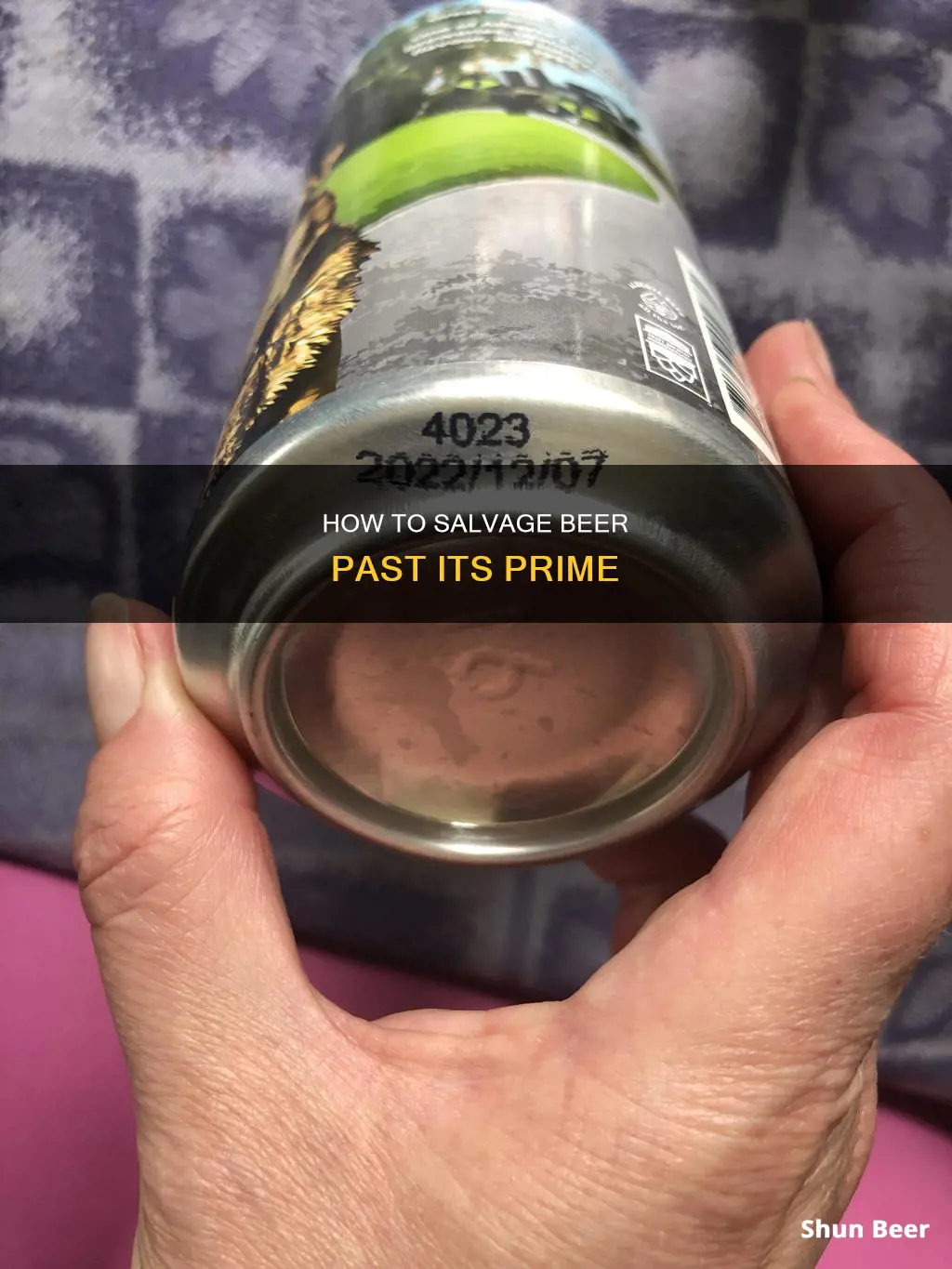
If you've bought expired beer, the first thing to know is that it's very unlikely to make you sick. The fermentation process, low pH level, and alcohol content of beer create an environment that's unfriendly to microorganisms. However, the taste of the beer will likely have changed, and not for the better. So, if you've bought expired beer, the best course of action is to return it to the store and get a refund. If the beer is from a small local brewery, you could also try contacting the brewery directly, as they may be more concerned about their reputation and the quality of their product.
| Characteristics | Values |
|---|---|
| Beer expiration | Beer does expire but it won't make you sick unless it's unpasteurised |
| Beer expiration taste | Unpleasant tastes and aromas |
| Beer shelf life | 5-9 months beyond the expiration date at room temperature, 2-3 years in a refrigerator |
| Beer shelf life (opened) | About a day |
| Beer expiration and packaging | Beer in transparent bottles has a shorter shelf life |
| Beer expiration and ABV | Higher ABV beers taste better with age |
| Beer expiration and packaging | Beer in aluminium cans blocks out direct sunlight, oxygen and other potential foreign impurities |
| Beer expiration and packaging | Beer in brown bottles offers the most protection, green bottles are fairly effective, clear bottles offer the least resistance to direct sunlight |
| Beer expiration and temperature | Beer stored in a refrigerator away from direct sunlight is best |
| Beer storage | Refrigerate, store in a dark place, keep upright |
What You'll Learn

Check if it's safe to drink
Checking if Expired Beer is Safe to Drink
The Fermentation Process
The fermentation process used in brewing, along with the low pH level and alcohol content, makes beer an unfriendly environment for microorganisms. This means that even if a beer sits on the shelf for years, as long as it's sealed, it's unlikely to make you sick.
Fizziness
If your beer has lost its fizz, it's a sign that the seal was broken at some point, and the flavour will be compromised.
Taste
If a non-tangy or non-acidic beer has a vinegary taste, it's an indication that bacteria has gotten into the beer, and it should be thrown out.
Hissing Sound
Pay attention to the noise your beer makes when you crack it open. If there's an absence of the signature hissing sound, it means the beer has lost its carbonation.
Foam
If your beer is fresh, you'll often notice white foam rising to the top and spilling over. If you don't see this, it's likely that your beer has gone flat.
Bottle Inspection
Inspect the label to check if it's dusty – this is a good indication that the beer has been sitting on the shelf for a while.
Sediments
Hold the bottle up against the light and check for any sediments settled at the bottom. If there are, it's probably best to avoid drinking the beer. However, in some beer styles such as German Weissbier and Belgian Dubbel, yeast sediments are not considered a flaw.
Leakage
Check for leakage around the sealed mouth of the bottle – this may indicate that the bottle and its contents have been subjected to high levels of heat.
Sip Test
If all else fails, take a sip. You'll taste the flatness, 'off' flavours, and skunky aromas right away, indicating that your beer has lost its quality.
Clarksville, TN: Beer Buying Time Restrictions
You may want to see also

Assess the taste and quality
If you've bought expired beer, the first thing you'll want to do is assess its taste and quality. This is because, while drinking expired beer is unlikely to make you sick, its flavour and quality will degrade over time.
The best way to determine whether your beer has expired is to check for an expiration or "best before" date on the packaging. If there is no date listed, look for signs of deterioration. For example, if the beer has lost its carbonation, it will not make the signature hissing sound when you open it, and you may not see white foam rise to the top. If you're drinking from a bottle, check if the label is dusty, or if there are any signs of leakage around the sealed mouth. You can also hold the bottle up to the light to check for sediments at the bottom. While these are usually a sign that the beer has expired, they are not considered a flaw in some beer styles, such as German Weissbier and Belgian Dubbel.
If you notice any of these signs, it's probably best to avoid drinking the beer. However, the only way to be completely sure is to take a sip. If you do, you'll likely experience unpleasant tastes and aromas, such as flatness, "off" flavours, and skunky aromas.
Beers with higher ABV, such as stouts and barley wines, tend to have longer shelf lives and can taste better with age. On the other hand, hoppy beers like IPAs are best consumed fresh, as the volatile aromas from hops tend to dissipate over time.
To summarise, while drinking expired beer is unlikely to make you sick, it's important to assess its taste and quality before consuming it. Look for signs of deterioration, such as a lack of carbonation or a dusty bottle, and be prepared for unpleasant flavours and aromas if you do decide to take a sip.
Presidente Beer: US Availability and Where to Buy
You may want to see also

Store it correctly
Storing beer correctly is essential to maintaining its freshness and quality. Here are some tips to ensure your beer stays in optimal condition:
Refrigerate or Store in a Cool Place
Beer should be stored in a cool environment. Refrigeration is ideal as it not only keeps the beer chilled for consumption but also helps preserve its quality. The recommended temperature range for beer storage is between 50 to 55 degrees Fahrenheit. If you don't have access to a refrigerator, aim for a cool, dark room with minimal temperature fluctuations, such as a basement.
Store in a Dark Place
Protect your beer from direct sunlight and UV rays by storing it in a dark place. UV rays can cause a chemical reaction with the hop compounds in beer, resulting in an unpleasant skunky odour and taste. Brown glass bottles offer the best protection against UV light, while green and clear glass bottles provide less or no protection, respectively.
Keep it Upright
Storing beer upright minimises the surface area exposed to oxidation. When beer is left lying on its side, more of it comes into contact with oxygen, increasing the rate of oxidation and potentially affecting its taste and quality.
Choose the Right Container
Different containers offer varying levels of protection for your beer. Aluminium cans are excellent at blocking out light, preventing "skunking" and slowing down the oxidation process. Brown glass bottles also provide good protection against UV rays. Clear or green glass bottles, on the other hand, offer little to no defence against light exposure, so beer packaged in these bottles may have a shorter shelf life.
Be Mindful of Temperature Fluctuations
Try to avoid frequent or extreme temperature changes. Major temperature shifts, such as transferring beer from an ice-cold cooler to a hot car, can negatively impact its quality. Consistent storage temperatures help maintain the freshness and flavour of your beer.
Check the Expiration Date
Always check the expiration date on the package or bottle. Beer is best consumed within a few months of the date listed, especially for hop-heavy styles like IPAs. While drinking expired beer is generally safe, it may not taste as good due to flavour degradation over time.
By following these storage guidelines, you can maximise the shelf life of your beer and ensure that every sip is as refreshing and flavourful as possible.
Narragansett Beer: Available in Connecticut?
You may want to see also

Contact the brewery
If you've bought expired beer, the best course of action is to contact the brewery. While it may not be a pleasant experience, it's important to remember that the brewery will want to protect its reputation and ensure the quality of its product. Here are some steps you can take:
- Identify the Brewery: Note down the name and contact information of the brewery. This information is usually found on the beer can, bottle, or packaging.
- Gather Information: Before reaching out, gather all the relevant information, including the batch number, expiration date, and details of where and when you purchased the beer. If possible, take photos of the beer and its packaging, focusing on the expiration date and any visible signs of deterioration.
- Contact the Brewery: Reach out to the brewery's customer service team via email, phone, or their website's contact form. Provide them with the information you've gathered, including any photos. It is important to remain calm and polite throughout the conversation.
- Explain the Issue: Clearly explain the issue you've encountered with the expired beer. Mention any unusual tastes, aromas, or signs of spoilage. If you have any health concerns, be sure to bring them up.
- Request a Resolution: Depending on the situation, you may want to request a refund, replacement, or other form of compensation. It is important to remember that breweries are often willing to work with customers to find a satisfactory solution.
- Provide Feedback: If the brewery is receptive to your concerns, provide constructive feedback on how they can improve their processes to avoid similar issues in the future. Your feedback can help them enhance their quality control measures.
- Follow Up: If you don't hear back from the brewery or are unsatisfied with their initial response, don't hesitate to follow up. You can try contacting them through a different channel or reaching out to a higher authority within the company.
Remember, when contacting the brewery, it's important to remain respectful and understanding. In most cases, they will be willing to work with you to resolve the issue. By providing detailed information and constructive feedback, you can help them improve their processes and ensure the quality of their beer.
Red Stripe Beer: Availability in Canada Explored
You may want to see also

Check the local laws
If you've bought expired beer, the first thing to do is check your local laws. While it may be disappointing to discover that your beer has expired, it's important to understand the legal implications and your rights as a consumer.
In most states, it is illegal to sell or purchase alcohol with an expired license. However, during the Coronavirus pandemic, some states, such as Kentucky, Indiana, and California, extended expiration dates on licenses due to office closures. This created a temporary loophole where individuals could purchase alcohol with recently expired licenses.
Even within a single state, the rules can vary depending on the specific store and the discretion of the cashier or bartender. For example, in North Carolina, there is no specific rule requiring a current ID for purchasing alcohol, but it is considered best practice to use a valid and current form of identification. Ultimately, it is up to the store or bartender to decide whether to accept an expired ID, and they may face legal consequences if found serving minors.
If you find yourself in a situation where you have purchased expired beer, it's important to understand the local laws and regulations regarding such cases. While it may be frustrating, knowing your rights and the seller's responsibilities can help you navigate the situation effectively.
In addition to checking local laws, you can also take other steps such as contacting the brewery or distributor, expressing your concerns to the store management, or simply choosing to take your business elsewhere. Remember, staying informed about the laws in your area can help you make more informed decisions when dealing with expired beer or any other alcohol-related concerns.
Buying Beer on Easter Sunday: Texas Laws Explained
You may want to see also
Frequently asked questions
Don't panic! Drinking expired beer is very unlikely to make you sick, though it may taste unpleasant. If you've bought beer that's past its best, you can try to return it to the store you bought it from, or contact the brewery directly.
Check the packaging for an expiration date. If there isn't one, look for a “Best By” date or the date it was brewed. You can also check for signs of spoilage: if the beer has lost its carbonation, or if there are sediments at the bottom of the bottle or can.
Drinking expired beer is very unlikely to make you sick, though it may taste unpleasant. At worst, you might experience a mild upset stomach after consuming pasteurised beer that's gone off.







